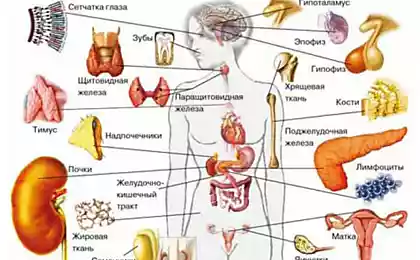496
9 scientific evidence of the impact of kindergartens on the level of the hormone of fear
Seventeen million nine hundred sixty seven thousand nine hundred twenty six
Has been studied 9 scientific papers (5 of which were conducted in the USA and 4 in Europe), is devoted to the changes in cortisol levels in children attending kindergartens. Key conclusion: while in kindergarten cortisol levels in children higher than at home. Also during the day there is a significant difference in the change in cortisol in children in kindergarten and at home: in the kindergarten after lunch there is an increase in level, home cortisol levels during the day falls (the norm for healthy people).
We explored all the works in the possible impact of quality kindergarten, age, gender and characteristics of child temperament on cortisol level. The most influential factor was age. Younger children (about 3 years) had higher cortisol levels than older children (5-8 years), most of the cortisol level increased in children under 3 years.
Even in orchards with very high standards the children had marked elevated levels of cortisol. It was higher in large groups(more than 15 children in class) in groups with a large difference in the age of the children (over 6 months), and less space for play for one child (less than 5M2) and a large number of adults in the room (maximum of 4 adults).
Heightened cortisol levels of children attending preschool institutions we associate with a stressful communication in the team. (I associate it with the division or with the anxiety of separation from the primary attachment of the child, although the staff, of course, adds).
Stress response while in kindergarten may be caused by the fact that the finding of the child in a group of peers is a situation of trebouxia frequent emotional arousal. For example, studies of adults show that the highest spike in cortisol levels is observed in situations of uncontrollable social threat (for a simple when you are in the company of unpredictable unfriendly people). In the garden, in a large group of peers, children are more prone to get into a situation of social danger. For example, there is evidence that problems with peers are associated with a high level of cortisol in 3-5 years.
Studies with animals show that the amount of time spent in communication with sversnikami effect on elevated cortisol. So young rhesus macaques, conducted most of the day in the company 4 itself such animals had cortisol levels significantly above their sversnikami, conducted in the company of only 2 hours a day.
Other sources of stress are long-time separation from parents and the need to model safe behavior in relation to numerous adults. For example, in one study, 20 hours of observation were recorded 345 stressful situations.
Studies show that the presence of attentive loving adult can reduce of the stress response.
Differences in the change of cortisol levels throughout the day
At home in all cases the standard daily pattern of changes in cortisol levels — the highest level has always been in the morning, about 30 minutes after lifting with a sharp decline in the next 2 hours and a gradual decrease during the day and evening.
But in preschool institutions in the same children to the evening, there was a significant increase in the level of cortisol. The effect was noticeable only after several hours spent in kindergarten. Home cortisol levels become the norm.
With increasing age of the child daily changes in cortisol levels were approaching normal.
The level of cotisol increased in children in kindergarten even in the presence of mothers. (Because children experience separation anxiety, especially if you already had the sad experience)
Affect the situation (more formal — less formal), the duration of stay (hours per day), frequency of stay (days per week)
As prolonged elevated levels of cortisol affect the future development of the child?
None of the studies did not aim to study the effect of long - (moderately) elevated cortisol on child development, so we are unable to say with certainty whether elevated cortisol specific adaptive response to the stress of being in a team, either this is a survival threat for later development.
It is considered that the constant elevated levels of stress hormones is dangerous because it undermines the immune system. Elevated levels of cortisol have a child in kindergarten can be a functional response to the stress of being in a team, but at the same time will weaken the child's body.
With regard to the risks for the future development of the child, it was proved that elevated levels of cortisol for long periods of time is associated with deterioration of learning and disease in animals and people (children no data). There is no empirical evidence that elevated levels of cortisol in the DDU will seriously affect the further development of the child. It can be assumed that more sensitive children are forced at an early age to confront the stressful situation of being in a team without an adequate social support may be at greater risk.
Here there is evidence that polluted air is harmful to a growing child's body. The reaction of the organism can be varied, from almost imperceptible — slight anemia, loss of appetite, lethargy, to severe asthma, up to impossibility to exist without a respirator.
Parents, too, can behave differently, someone to solve the problem fundamentally, moving to live out of the city to the village, someone tries the children in the summer to take to the cottage, chooses to life a more environmentally friendly area and is not walking with the children on polluted streets. I admit that there are others who believe that the exhaust gases is useful because the child to live in the city, so let him get used from an early age. Not want to walk? — Wash less necessary. Eating less? — Saving. Sluggish? The house, less noise from it. I have these parents not seen, but the theory of probability, to admit their existence.
There is evidence that separating the child from his primary attachment a detrimental effect on psycho-emotional development of children. About the attachment, I wrote about the development still going to write, but the connection between them is that only the child is deeply rooted in attachment, you receive the "energy of passion", energy for exploring the world, the curiosity to what is happening around. Brain affection is primary, it is a basic need, and only when the child is saturated with affection, he is able to development, on creativity, on growing up.
Otherwise, the child gets "stuck" that it is easy to see, just look in the mirror or looking around. We live in a society of people who grew up in a situation wounded attachments: both parents worked full time, the child was in kindergarten\school, in the evening when the family gathered under one roof, always irritated tired parents never went further than reading a bedtime story or to ask about lessons.
Most have been raised in this environment, people stuck in the development of grown children. Men complain that after the birth of a child, the wife stopped paying attention to them the old, women, proud of the fact that they are not going to sacrifice myself to family and children. It is clear that all these complaints and "sacrifice" — from the unwillingness or inability to assume the role of a caring alpha. Because if you are in the caring alpha, you and in a head will not come that care of the weak, dependent creature is a sacrifice on your part, and the victim is unfair.
Imagine you planted a vegetable garden. Dug, raked, levelled with a rake, and there are already sprouts. In a conversation with a neighbor, it turns out that there will be freezing and it would be good to cover the sprouts with foil. But you have no time, film costs money, and go for it, and, in General, your mother always did without the film and anything that was grown.
After some time, the neighbor suggests that for two weeks there was no rain and it would be good to water the beds. But this is necessary to the well to go, carry water, and hard in no time. And in General...
When the neighbor hears that you are going on vacation to the sea for a month, he said that in this case a good harvest, you are unlikely to collect. Here your soul can not stand. — What?! I now have to (should) sacrifice himself to this garden? Yes, I'll go crazy if I have to spend all summer in the beds, I have a right to privacy!
Of course, you have the right. You have all the rights. My job is to warn. Mind you, unlike your neighbor, I do not go to you and give advice only when I ask.
But if I write that the social brain in children is being formed not before 4-5 years, mixed feelings, they are able to test not earlier than 6-7 years, in kindergartens in a few hours you start to feel stress, it is not because I here's a radish, I decided to call the sense of guilt and inferiority from parents driving children to kindergartens. Believe me, with their time have something to do and besides. Just someone had to say it, and that someone will be me.
Affection is primary, and kindergarten — this is a test for attachment. Always. Because kindergarten was not originally included in the circle of the affections of the child, and the law of polarization of the affections, the family and the garden soon will be on different poles than one. Although there is the exception that proves the rule: that is, if you or someone in your family works in the garden, and your child hanging out there, as the house and knows everyone, and everyone knows it.
You have a caring alpha, there is every opportunity to minimize the devastating impact of the garden on your attachment with your child, but this needs to be addressed, and not rely on chance. How? I write about it.
Of course, children are different, and the gardens are different, and I'll write separately on what to pay attention when all, in your opinion, is "going well" and the child "walks with pleasure". And about "perfect" from my point of view, the garden I write. But the problem exists, and to deny it is like that to hide your head in the sand.
Author: Olga Pisarik
Source: olgapisaryk.livejournal.com/101569.html
Has been studied 9 scientific papers (5 of which were conducted in the USA and 4 in Europe), is devoted to the changes in cortisol levels in children attending kindergartens. Key conclusion: while in kindergarten cortisol levels in children higher than at home. Also during the day there is a significant difference in the change in cortisol in children in kindergarten and at home: in the kindergarten after lunch there is an increase in level, home cortisol levels during the day falls (the norm for healthy people).
We explored all the works in the possible impact of quality kindergarten, age, gender and characteristics of child temperament on cortisol level. The most influential factor was age. Younger children (about 3 years) had higher cortisol levels than older children (5-8 years), most of the cortisol level increased in children under 3 years.
Even in orchards with very high standards the children had marked elevated levels of cortisol. It was higher in large groups(more than 15 children in class) in groups with a large difference in the age of the children (over 6 months), and less space for play for one child (less than 5M2) and a large number of adults in the room (maximum of 4 adults).
Heightened cortisol levels of children attending preschool institutions we associate with a stressful communication in the team. (I associate it with the division or with the anxiety of separation from the primary attachment of the child, although the staff, of course, adds).
Stress response while in kindergarten may be caused by the fact that the finding of the child in a group of peers is a situation of trebouxia frequent emotional arousal. For example, studies of adults show that the highest spike in cortisol levels is observed in situations of uncontrollable social threat (for a simple when you are in the company of unpredictable unfriendly people). In the garden, in a large group of peers, children are more prone to get into a situation of social danger. For example, there is evidence that problems with peers are associated with a high level of cortisol in 3-5 years.
Studies with animals show that the amount of time spent in communication with sversnikami effect on elevated cortisol. So young rhesus macaques, conducted most of the day in the company 4 itself such animals had cortisol levels significantly above their sversnikami, conducted in the company of only 2 hours a day.
Other sources of stress are long-time separation from parents and the need to model safe behavior in relation to numerous adults. For example, in one study, 20 hours of observation were recorded 345 stressful situations.
Studies show that the presence of attentive loving adult can reduce of the stress response.
Differences in the change of cortisol levels throughout the day
At home in all cases the standard daily pattern of changes in cortisol levels — the highest level has always been in the morning, about 30 minutes after lifting with a sharp decline in the next 2 hours and a gradual decrease during the day and evening.
But in preschool institutions in the same children to the evening, there was a significant increase in the level of cortisol. The effect was noticeable only after several hours spent in kindergarten. Home cortisol levels become the norm.
With increasing age of the child daily changes in cortisol levels were approaching normal.
The level of cotisol increased in children in kindergarten even in the presence of mothers. (Because children experience separation anxiety, especially if you already had the sad experience)
Affect the situation (more formal — less formal), the duration of stay (hours per day), frequency of stay (days per week)
As prolonged elevated levels of cortisol affect the future development of the child?
None of the studies did not aim to study the effect of long - (moderately) elevated cortisol on child development, so we are unable to say with certainty whether elevated cortisol specific adaptive response to the stress of being in a team, either this is a survival threat for later development.
It is considered that the constant elevated levels of stress hormones is dangerous because it undermines the immune system. Elevated levels of cortisol have a child in kindergarten can be a functional response to the stress of being in a team, but at the same time will weaken the child's body.
With regard to the risks for the future development of the child, it was proved that elevated levels of cortisol for long periods of time is associated with deterioration of learning and disease in animals and people (children no data). There is no empirical evidence that elevated levels of cortisol in the DDU will seriously affect the further development of the child. It can be assumed that more sensitive children are forced at an early age to confront the stressful situation of being in a team without an adequate social support may be at greater risk.
Here there is evidence that polluted air is harmful to a growing child's body. The reaction of the organism can be varied, from almost imperceptible — slight anemia, loss of appetite, lethargy, to severe asthma, up to impossibility to exist without a respirator.
Parents, too, can behave differently, someone to solve the problem fundamentally, moving to live out of the city to the village, someone tries the children in the summer to take to the cottage, chooses to life a more environmentally friendly area and is not walking with the children on polluted streets. I admit that there are others who believe that the exhaust gases is useful because the child to live in the city, so let him get used from an early age. Not want to walk? — Wash less necessary. Eating less? — Saving. Sluggish? The house, less noise from it. I have these parents not seen, but the theory of probability, to admit their existence.
There is evidence that separating the child from his primary attachment a detrimental effect on psycho-emotional development of children. About the attachment, I wrote about the development still going to write, but the connection between them is that only the child is deeply rooted in attachment, you receive the "energy of passion", energy for exploring the world, the curiosity to what is happening around. Brain affection is primary, it is a basic need, and only when the child is saturated with affection, he is able to development, on creativity, on growing up.
Otherwise, the child gets "stuck" that it is easy to see, just look in the mirror or looking around. We live in a society of people who grew up in a situation wounded attachments: both parents worked full time, the child was in kindergarten\school, in the evening when the family gathered under one roof, always irritated tired parents never went further than reading a bedtime story or to ask about lessons.
Most have been raised in this environment, people stuck in the development of grown children. Men complain that after the birth of a child, the wife stopped paying attention to them the old, women, proud of the fact that they are not going to sacrifice myself to family and children. It is clear that all these complaints and "sacrifice" — from the unwillingness or inability to assume the role of a caring alpha. Because if you are in the caring alpha, you and in a head will not come that care of the weak, dependent creature is a sacrifice on your part, and the victim is unfair.
Imagine you planted a vegetable garden. Dug, raked, levelled with a rake, and there are already sprouts. In a conversation with a neighbor, it turns out that there will be freezing and it would be good to cover the sprouts with foil. But you have no time, film costs money, and go for it, and, in General, your mother always did without the film and anything that was grown.
After some time, the neighbor suggests that for two weeks there was no rain and it would be good to water the beds. But this is necessary to the well to go, carry water, and hard in no time. And in General...
When the neighbor hears that you are going on vacation to the sea for a month, he said that in this case a good harvest, you are unlikely to collect. Here your soul can not stand. — What?! I now have to (should) sacrifice himself to this garden? Yes, I'll go crazy if I have to spend all summer in the beds, I have a right to privacy!
Of course, you have the right. You have all the rights. My job is to warn. Mind you, unlike your neighbor, I do not go to you and give advice only when I ask.
But if I write that the social brain in children is being formed not before 4-5 years, mixed feelings, they are able to test not earlier than 6-7 years, in kindergartens in a few hours you start to feel stress, it is not because I here's a radish, I decided to call the sense of guilt and inferiority from parents driving children to kindergartens. Believe me, with their time have something to do and besides. Just someone had to say it, and that someone will be me.
Affection is primary, and kindergarten — this is a test for attachment. Always. Because kindergarten was not originally included in the circle of the affections of the child, and the law of polarization of the affections, the family and the garden soon will be on different poles than one. Although there is the exception that proves the rule: that is, if you or someone in your family works in the garden, and your child hanging out there, as the house and knows everyone, and everyone knows it.
You have a caring alpha, there is every opportunity to minimize the devastating impact of the garden on your attachment with your child, but this needs to be addressed, and not rely on chance. How? I write about it.
Of course, children are different, and the gardens are different, and I'll write separately on what to pay attention when all, in your opinion, is "going well" and the child "walks with pleasure". And about "perfect" from my point of view, the garden I write. But the problem exists, and to deny it is like that to hide your head in the sand.
Author: Olga Pisarik
Source: olgapisaryk.livejournal.com/101569.html























